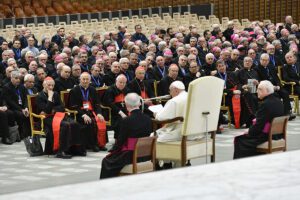VATICAN CITY (CNS) – While the release of the working document for the Synod of Bishops on synodality is expected sometime in early June, Pope Francis tried to respond to some of the questions and concerns about the synod process that already have been raised.

Meeting at the Vatican May 25 with members of the Italian bishops’ conference and the people they chose to coordinate work for an Italian synod, the pope gave a succinct description of what he means by a “synodal church”:
“Every baptized person is called to actively participate in the life and in the mission of the church, starting from the specifics of one’s own vocation, in relationship with others and with the charisms given by the Spirit for the good of all. We need Christian communities in which space is enlarged, where everyone can feel at home, where pastoral structures and means foster not the creation of small groups, but the joy of being and feeling co-responsible.”
Evangelization is at stake, he said. “A church weighed down by structures, bureaucracy and formalism will struggle to walk in history at the pace of the Spirit, meeting the men and women of our time.”
“The great enemy of this process,” he said, “is fear.”
Pope Francis said that as he entered the Vatican audience hall for the meeting, someone — using an Argentinian phrase that is not very polite, nor is its translation in Italian, he said — told him that the whole synod process is creating a mess.
“Think about the apostles on the morning of Pentecost,” the pope said. If the synod is “a blank,” he said to laughter, “Pentecost morning was even worse. It was worse. Total disorder. And who provoked that mess? The Holy Spirit. He’s good at creating disorder to move people. But the same Spirit also provoked harmony.”
“Don’t be afraid when there is disorder provoked by the Spirit,” Pope Francis said. One need fear “only when it is provoked by our selfishness or the spirit of evil.”
Speaking just a few days before Pentecost, the pope urged everyone, but especially the fearful, to pray for an outpouring of the Holy Spirit, who opens people to listen to others, who makes dialogue fruitful, enlightens discernment and guides choices and decisions.
Pope Francis told the bishops and representatives that he would try to respond to their questions about “the priorities for the church in relation to society, about how to overcome resistance and concerns, on the involvement of priests and lay people, and on the experiences of marginalization.”
Church unity and shared responsibility are essential, he said. An “always lurking” temptation is to rely on “a few ‘qualified actors’ who carry out pastoral activity” while the rest of the faithful stand by and watch.
“Sometimes one gets the impression that religious communities, chanceries and parishes are still too self-referential,” Pope Francis said.
“There seems to creep in, somewhat covertly, a kind of “defensive neoclericalism’ – clericalism is a perversion,” he said. It is “generated by a fearful attitude, by complaints that the world does not understand us anymore, that young people are lost and by a need to reiterate and make one’s influence felt.”
Obviously, the pope said, a “synodal church,” one where all are welcome, where all share the mission and contribute their prayer, time and talents will have an impact on those the Catholic Church still believes have been chosen by God and given special gifts to lead and to discern.
“We must ask the Holy Spirit to make us understand and experience how to be ordained ministers and how to exercise ministry in this time and in this church: never without the Other with a capital ‘O,’ but also never without others with whom we share the journey.”
“This applies to the bishops, whose ministry cannot do without that of priests and deacons” and to priests and deacons who must work with each other and the faithful, the pope said. “But this is also true for the entire community of the baptized, in which each one walks with other brothers and sisters in the school of the one Gospel and in the light of the Spirit.”
Promoting co-responsibility in the church, he said, is not simply a matter of finding a new way to “distribute power.”
Rather, he said, it means learning how to recognize the gifts of each person, particularly those “who still struggle to see their presence recognized in the church, those who do not have a voice, those whose voices are drowned out or even silenced or ignored, those who feel inadequate perhaps because they have difficult or complex life paths (and) are sometimes almost ‘excommunicated’ a priori.”
Part of the goal of synodality, he said, is to “let God’s heart shine through – a heart open to all and for all.”
Pope Francis said those already active in the church need to remember the parable of the wedding feast from Matthew 22. “When none of the invited guests show up, what does that gentleman say? ‘Go to the crossroads and call everyone.’ Everyone: sick, healthy, righteous, sinners, everyone, everyone.”
“We should ask ourselves how much space we make and how much we really listen in our communities to the voices of young people, women, the poor, those who are disappointed, those who have been hurt in life and are angry with the church,” the pope said. “As long as their presence remains sporadic in ecclesial life overall, the church will not be synodal, it will be a church of the few.”
